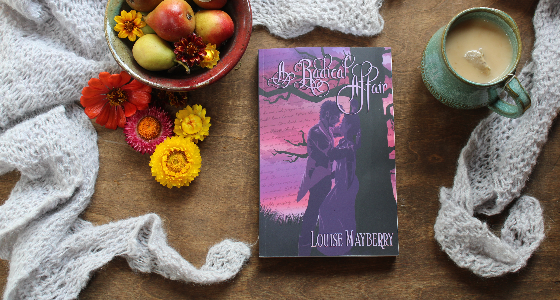
The word that defined "A Radical Affair"
Share
PREGNANT.
This was actually the working title of A Radical Affair for most of the time I was writing. It sums up the plot quite well. But it's also a tricky word, especially for a historical writer. One of the cardinal rules of writing in the Regency or Victorian periods is that one must never use this word. To use the word pregnant in a historical novel, we're taught, would be the ultimate anachronism. Instead, we're coached to use evasive euphemisms like "confinement," or "lying in," or "in that way."
Well, that all sounded fine, until I came across the following sentence in Mary Wollstonecraft's unfinished novel from 1792, Maria or the Wrongs of Woman:
... I was ashamed to own, that I was pregnant.
That it. Three little words. I was pregnant. They seem so innocuous to modern eyes, but in 1792... this statement, in print, would have been jaw-dropping. And Wollstonecraft didn't only use the forbidden word in the text of the novel, it's also in the notes she left, sketching out her ideas for the ending. (She died, tragically, and somewhat ironically in childbirth, before she finished Maria.)
So, obviously, Wollstonecraft knew and used this word. My character, Cybil, had read, and was influenced by Wollstonecraft's work, particularly this novel. So why couldn't she use it?
Out of the the flurry of research that followed came an epiphany, and Cybil's perspective, within the historical context, became clear.
Pregnant has been used to refer to human gestation since the 14th century. It's easily found in medical texts. It just wasn't used in "polite" company. Like many words that describe the human (especially the female human's) body and its functions, it was regarded for hundreds of years as vulgar.
So why did Wollstonecraft use it? She's known as the one of the very first feminist thinkers in Western civilization, and she didn't write things by accident. Simply penning the word in a work indented for popular audiences, was, in itself, making a statement. But what was she trying to say?
While I can't pretend to know the answer to that, I can (and did) theorize.
The closest modern word I can think of that has a similar stigma to pregnant, is vagina. Utter that word in a crowded room and heads will turn. It feels difficult on the lips. Taboo. Yet, it's not slang. It's a word I've taught my young daughter, and it's a word we, as a culture, are slowly reclaiming to describe our bodies without stooping to degrading, or vague euphemisms like "down there," or "lady bits."
Perhaps Wollstonecraft used pregnant for the same reason. Perhaps her intent was to use language as a tool to fight against a misogynistic culture that not only taught women that their bodies were evil, but strove to keep them ignorant of their own anatomy and bodily function by withholding even the words to describe themselves.
And that, is the power of language. Of naming things to make them matter. Wollstonecraft understood this, and so does Cybil.
In closing, here's an edited excerpt from A Radical Affair - a passage I wrote not too long after discovering all of this.
~
CYBIL LIFTED THE PEN, scowling at the paper. How stupid that one couldn’t just use the word pregnant. I was pregnant would be so much more impactful than the offspring of shame and guilt was growing within me. But, of course, she couldn’t—not if she wanted anyone to read this work. Wollstonecraft had used that exact phrase—I was pregnant—in her novel Maria, and look where that had gotten her. Her work had been condemned as vulgar, then forgotten. It was only by chance that Cybil had unearthed Aunt Cynthia’s dog-eared copy when she’d been visiting Glasgow after Percy's wedding four years ago. If only she’d read it before she agreed to marry Ernie.
It was difficult to see in the dim light. At home, she used three candles to write by. Here, she only dared ask Emily for one, and even then, she felt guilty for burning it half the night. But she could make out the writing well enough to notice the ink had flooded badly on this last page, each word bleeding out into the next. She’d need to sharpen the quill. She reached into the recesses of the desk and found her pen knife, then began the tedious work of cutting and trimming the tip.
Pregnant. She herself had dared to utter the word aloud only once, on that dreadful afternoon in Dunbar when she’d told Will. She’d been so tired, so thoroughly depressed that she hadn’t the energy to dance around the word with pretty dissimulations.
Oh, Will. For what seemed the millionth time since he’d left that morning, the tears prickled her eyes. She wiped them away, then dipped the quill in the ink, carefully scraping the excess away before lowering the pen to a blank page to test the cut. She wrote a large, looping P, then r-e-g-n-a-n-t. Better, but the letters still weren’t crisp enough. She took the knife up again, cutting away at the quill.
The fact was, like Louisa, like Wollstonecraft’s Maria, Cybil was pregnant. She’d avoided making a plan for her child, just as she’d avoided speaking the word.
She tried the quill again. Wrote the same word, larger this time. Pregnant. The ink flowed just as it should, crisp and sharp on the page.
~
This post originally appeared in my September 28th newsletter. To subscribe, and see more content like this, click here.
